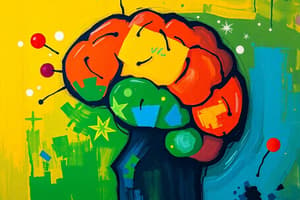Podcast
Questions and Answers
Which of the following scenarios best illustrates an active coping strategy for managing stress?
Which of the following scenarios best illustrates an active coping strategy for managing stress?
- Seeking advice and support from colleagues to address challenges in a team project. (correct)
- Avoiding thinking about a stressful work project to reduce anxiety.
- Becoming less physically active and avoiding social situations when feeling overwhelmed.
- Blaming oneself for not meeting expectations during a performance review.
How does eliciting positive emotions contribute to stress recovery?
How does eliciting positive emotions contribute to stress recovery?
- By having no impact on the autonomic nervous system.
- By slowing down the recovery of the autonomic nervous system.
- By prolonging autonomic nervous system arousal.
- By speeding up the recovery of the autonomic nervous system. (correct)
An individual who frequently responds with anxiety and anger is exhibiting which personality trait?
An individual who frequently responds with anxiety and anger is exhibiting which personality trait?
- Neuroticism. (correct)
- Extraversion.
- Openness to experience.
- Conscientiousness.
What is the primary focus of mindfulness meditation as a stress-reduction technique?
What is the primary focus of mindfulness meditation as a stress-reduction technique?
How does exercise impact the brain in a way that can help reduce stress?
How does exercise impact the brain in a way that can help reduce stress?
What is the gut-brain axis primarily responsible for?
What is the gut-brain axis primarily responsible for?
How might the concept of learned helplessness affect an individual facing a challenging situation?
How might the concept of learned helplessness affect an individual facing a challenging situation?
Which of the following is an example of compensatory control?
Which of the following is an example of compensatory control?
Scientific literacy influences the likelihood of believing conspiracy theories because it promotes:
Scientific literacy influences the likelihood of believing conspiracy theories because it promotes:
How does expressive writing therapy promote resilience?
How does expressive writing therapy promote resilience?
Which statement accurately distinguishes emotion-focused coping?
Which statement accurately distinguishes emotion-focused coping?
How do individuals high in conscientiousness typically cope with stress originating from their responsibilities?
How do individuals high in conscientiousness typically cope with stress originating from their responsibilities?
What role does seeking out help from others play in coping for individuals with extraversion/agreeableness?
What role does seeking out help from others play in coping for individuals with extraversion/agreeableness?
Post-traumatic growth is best described as:
Post-traumatic growth is best described as:
Which of the following statements best describes concentrative/focused attention meditation?
Which of the following statements best describes concentrative/focused attention meditation?
What percentage of serotonin in the brain is estimated to be produced by bacteria in the intestines?
What percentage of serotonin in the brain is estimated to be produced by bacteria in the intestines?
Learned helplessness is characterized by:
Learned helplessness is characterized by:
How might belief in conspiracy theories provide a sense of compensatory control?
How might belief in conspiracy theories provide a sense of compensatory control?
Which of the following cognitive biases is most closely associated with believing in conspiracy theories?
Which of the following cognitive biases is most closely associated with believing in conspiracy theories?
Compared to sedentary behavior, how does even a brief walk affect brain activity?
Compared to sedentary behavior, how does even a brief walk affect brain activity?
Flashcards
Coping
Coping
The processes used to manage stress
Active coping
Active coping
Taking direct action through problem-solving and seeking support.
Passive coping
Passive coping
Avoiding or minimizing the stressor, often through disengagement.
Problem Focused Coping
Problem Focused Coping
Signup and view all the flashcards
Emotion Focused Coping
Emotion Focused Coping
Signup and view all the flashcards
Positive Emotions
Positive Emotions
Signup and view all the flashcards
Negative affectivity
Negative affectivity
Signup and view all the flashcards
Post-traumatic growth
Post-traumatic growth
Signup and view all the flashcards
Mindfulness Meditation
Mindfulness Meditation
Signup and view all the flashcards
Focused attention meditation
Focused attention meditation
Signup and view all the flashcards
BDNF
BDNF
Signup and view all the flashcards
Serotonin
Serotonin
Signup and view all the flashcards
Learned helplessness
Learned helplessness
Signup and view all the flashcards
Compensatory Control
Compensatory Control
Signup and view all the flashcards
Scientific literacy
Scientific literacy
Signup and view all the flashcards
Cognitive biases
Cognitive biases
Signup and view all the flashcards
Study Notes
- Coping strategies refer to the processes used to manage stress.
Active vs. Passive Coping
- Active coping involves physical activity, seeking information and support, relaxation exercises, and stress management.
- Passive coping includes avoiding the situation, physical inactivity, avoiding social situations, and self-blame.
Problem-Focused vs. Emotion-Focused Coping
- Problem-focused coping involves actively addressing the stressors.
- Emotion-focused coping involves managing the emotions that come with stressors.
Positive Emotions
- Eliciting positive emotions quickens the recovery of the autonomic nervous system.
- The recovery time (in seconds) for cardiovascular arousal varies by emotion:
- Sadness: 61
- Neutral: 40
- Amusement: 20
- Contentment: 18
Personality and Coping
- Neuroticism is associated with negative affectivity, or the tendency to respond with anxiety, hostility, anger, and guilt.
- Extraversion/Agreeableness involves seeking help from others.
- Conscientiousness involves distancing, or suppressing emotions to reduce the effect of stress on responsibilities.
- Openness to experience involves being aware of and responsive to one's emotions.
Promoting Resilience
- Expressive writing therapy can promote resilience.
- Post-traumatic growth signifies the ability to grow and experience long-term positive effects in response to negative events.
- The result comes from coping, and not the stressful event.
Meditation
- Mindfulness/open-monitoring meditation involves attending to all thoughts, sensations, and feelings without trying to judge or control them.
- Concentrative/focused attention meditation involves focusing on a specific thought or sensation.
- Meditation is associated with neural changes that improve metacognition and executive functions.
Exercise
- Exercise prompts the release of brain-derived neurotrophic factor (BDNF), a protein that promotes survival, growth, and formation of new synapses in the nervous system.
- Exercise slows the progression of Alzheimer's.
Diet and the Microbiome
- 90% of serotonin circulating in the brain is produced by bacteria in the intestines.
- Animal models suggest the microbiome can influence behavior and brain chemistry.
Perceived Control
- Learned helplessness refers to an acquired suppression of avoidance or escape behavior in response to unpleasant, uncontrollable circumstances.
- Individuals may generalize the belief that their actions cannot remove stress from one situation to other situations.
Compensatory Control
- Psychological strategies are used to preserve a sense of nonrandom order when personal control is compromised.
- These strategies involve superstitions, conspiracy theories, and the "just world" belief.
Conspiracy Theories
- Lower scientific literacy is linked to objectivity and tolerating ambiguity.
- Cognitive biases like confirmation bias and base rate neglect contribute to conspiracy theories.
- Social influences like conformity and group think play a role.
Studying That Suits You
Use AI to generate personalized quizzes and flashcards to suit your learning preferences.




